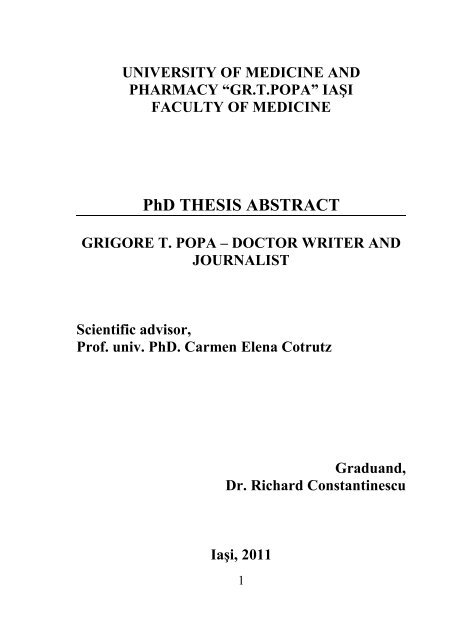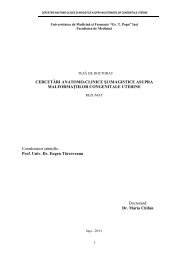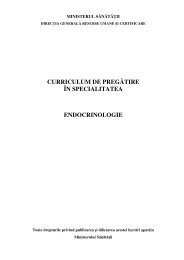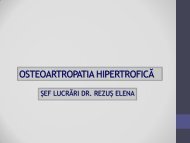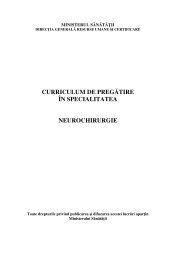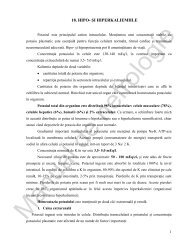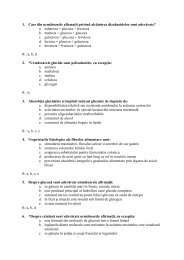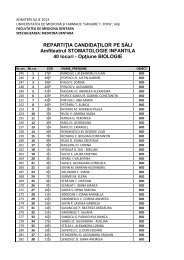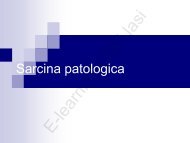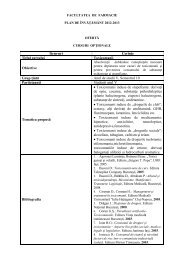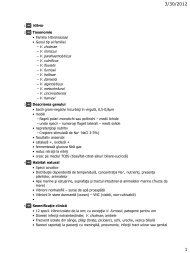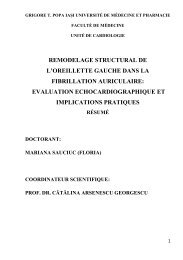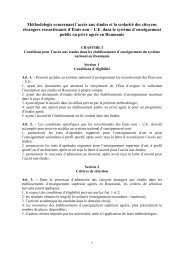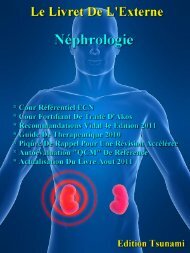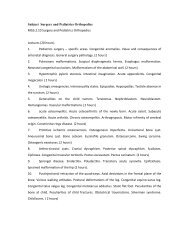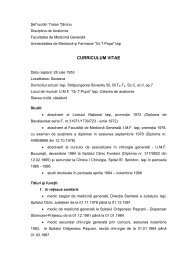PhD THESIS ABSTRACT - Gr.T. Popa
PhD THESIS ABSTRACT - Gr.T. Popa
PhD THESIS ABSTRACT - Gr.T. Popa
Create successful ePaper yourself
Turn your PDF publications into a flip-book with our unique Google optimized e-Paper software.
UNIVERSITY OF MEDICINE AND<br />
PHARMACY “GR.T.POPA” IAŞI<br />
FACULTY OF MEDICINE<br />
<strong>PhD</strong> <strong>THESIS</strong> <strong>ABSTRACT</strong><br />
GRIGORE T. POPA – DOCTOR WRITER AND<br />
JOURNALIST<br />
Scientific advisor,<br />
Prof. univ. <strong>PhD</strong>. Carmen Elena Cotrutz<br />
<strong>Gr</strong>aduand,<br />
Dr. Richard Constantinescu<br />
Iaşi, 2011<br />
1
GRIGORE T. POPA – DOCTOR WRITER AND<br />
JOURNALIST<br />
...take risks and make sacrifices, because life steps on risks<br />
and progress is built on sacrifices.<br />
<strong>Gr</strong>igore T. <strong>Popa</strong><br />
Each person’s life, no matter how insignificant, has its<br />
moments that can serve as an example by other people. But<br />
most of all, the life of the chosen ones, of those rare<br />
personalities who marked the collective life of a certain people<br />
or even of the entire humanity, can show us all the right way to<br />
perfection. 1<br />
In a volume published in the 1930s, Professor Nicolae<br />
Leon noticed the value of some young collegiates “that carried<br />
on their activity in Iasi in those times” and was certain that<br />
their work would become landmarks for the next generations.<br />
<strong>Gr</strong>igore T. <strong>Popa</strong> was one of the four people mentioned by<br />
Nicolae Leon. “(…) I am sure that after 40 years – if they don’t<br />
become interested in politics – their work will be discussed, as<br />
we currently discuss the work of V. Conta, A.D. Xenopol, Al<br />
Philippide or Dimitrie Alexandrescu.” 2<br />
Professor Leon’s intuition proved to be right. <strong>Gr</strong>igore<br />
T. <strong>Popa</strong> had nothing to do with politics and his scientific and<br />
social achievements were extremely important. What can we<br />
notice today? <strong>Gr</strong>igore T. <strong>Popa</strong>’s name appears on T-shirts and<br />
1 Dr. <strong>Gr</strong>. T. <strong>Popa</strong>, Învăţaţii noştrii. Dr. I. Cantacuzino, Ed. „Cartea<br />
Românească”, Bucureşti, ... , p. 3.<br />
2 Prof. dr. Nicolae Leon, Note şi amintiri, „Cartea Românească”, Bucureşti,<br />
1933, p. 249.<br />
3
all-point pens, it is the name of a street in Timisoara, a piece<br />
of information in high school textbooks 3 and an exam subject<br />
in the students’ mobile phones. Haven’t you seen <strong>Gr</strong>igore T.<br />
<strong>Popa</strong>’s name on many doors? Have you ever wondered what<br />
this person was like? Rousseau, in a letter to the mathematician<br />
and phyisicist Jean le Rond d’Alembert wrote these words<br />
”Nowadays, Sir, we are not great enough to know how to<br />
admire you”. Nowadays, Mr. <strong>Gr</strong>igore T. <strong>Popa</strong>, we are not great<br />
enough to know how to admire you.<br />
<strong>Gr</strong>igore T. <strong>Popa</strong> was interested in many different fields,<br />
and this was not out of snobishness or hypocrisy, but with real<br />
competences, and many of his ideas are still up-to-date. Noica<br />
said about this type of intellectual that „...when he is great, the<br />
Romanian scientist can’t bear to have one simple<br />
specialization. Cantemir, for example, couldn’t stick to one<br />
specialization and nor could Ion Heliade Radulescu, or Hasdeu,<br />
or Iorga in the field of history, or Parvan in Classicism and<br />
later in archaeology, or Enescu in music, or Coanda in<br />
scientific inventions, or Blaga in literary creation, or Calinescu<br />
in culture and literary criticism, if we can mention him here, or<br />
Moisil in mathematics, with the same restraint however, or<br />
Stefan Lupascu in current phylosophy (he is probably not the<br />
3 In two alternative textbooks for the 11th grade (approved this year) we can<br />
find the following statement: ”the port-hypophysar system (described by the<br />
Romanian anatomist <strong>Gr</strong>. T. <strong>Popa</strong> together with Unna Fielding)” in Dan<br />
Cristescu, Carmen Salavastru, Bogdan Voiculescu, Cezar Th. Niculescu,<br />
Radu Carmaciu, Biology. Textbook for the 11th grade, Corint Publishing<br />
House, Bucharest, 2006, p. 54 and Elena Hutanu Crocnan, Irina Hutanu,<br />
Biology. Textbook for the 11th grade, The Didactic and Pedagogical<br />
Publishing House R.A., Bucharest, 2008, p. 69.<br />
4
only one to be interested in the whole body of new sciences),<br />
or this most outstanding example who is Mircea Eliade.” 4<br />
The thesis approaches <strong>Gr</strong>igore T. <strong>Popa</strong>’s work in the<br />
field of literature and journalism.<br />
In the magazine whose main co-founder was <strong>Gr</strong>igore T.<br />
<strong>Popa</strong>, entitled Insemnari iesene, for which he was journalist,<br />
literary critic, essay writer and prose writer, or in other<br />
numerous newspapers, magazines, leaflets and volumes that he<br />
published, <strong>Gr</strong>igore T. <strong>Popa</strong>’s writing was remarkable, as<br />
pointed out by C.D. Zeletin in his article ”The writer-doctor<br />
<strong>Gr</strong>igore T. <strong>Popa</strong>”, for its ”effervescence, erudition, polemical<br />
spirit, frank assertion, acid verb, courage of opinion, sense of<br />
humour. He combined in his writing a strong admiration for the<br />
eternal values of humanity with an infinite curiosity for modern<br />
values. There are few critics who can separate, as he does, the<br />
modern from the up-to-date, the up-to-date becoming modern<br />
only if it is endowed with perenial spiritual perspective and has<br />
overcome the censureship of time” 5 .<br />
Even in his college years he got involved in political,<br />
social and cultural problems, either directly or by means of the<br />
students that he was leading as General Secretary, Vice-<br />
President and later President of the ”Student Centre” in Iasi or<br />
as Dean of the Mihaileana University, main trustee of the ”St.<br />
Spiridon” Hospital board of trustees, President of the ”Didactic<br />
Circle” in Iasi, etc. or analyzing the events of the inter-war<br />
period, <strong>Gr</strong>igore T. <strong>Popa</strong>, by the competence with which he<br />
4 Constantin Noica, Despre lăutărism, Ed. Humanitas, Bucureşti, 2007.<br />
5 C.D. Zeletin, Scriitorul-medic <strong>Gr</strong>. T. <strong>Popa</strong>, sursa:<br />
http://www.rostonline.org/rost/oct2005/gr-t-popa.shtml.<br />
5
could approach any subject and in thousands of pages, offered<br />
to the Romanian literature and journalism an inheritance that<br />
deserves to be published in a collection.<br />
The reason for choosing the theme ”<strong>Gr</strong>igore T. <strong>Popa</strong> –<br />
doctor writer and journalist” is the discovery of a serious,<br />
competent, well-informed and objective writer who reveals a<br />
profound spirit not accustomed to any sacrifice.<br />
His name is linked to many important events that<br />
marked the student community in Iasi at the beginning of the<br />
20th century, the academic circles, the Romanian press, radio,<br />
the inter-war political circles (the political parties were<br />
interested in him), the relations with the Royal House or the<br />
Church, culminating with a conference at the Romanian<br />
Atheneum – ”The Christian morals in modern times. Is the<br />
faith in Jesus Christ’s teaching still possible nowadays?” which<br />
represented for <strong>Gr</strong>igore T. <strong>Popa</strong> the sentence to death, a death<br />
carefully prepared by those that he called representatives of the<br />
Antichrist.<br />
We can say that his life and everything that he wrote<br />
were sublimely ended by this conference and the following<br />
fragment can constitute a key to the interpretation of his<br />
creation:<br />
Today the humanity is embarassingly wandering in the<br />
darkness of feelings and the ruin of life, from where hope and<br />
the humanity have been banished. Trying to become<br />
superpeople, the disciples of Antichrist have turned into beasts<br />
who destroy all culture and civilization.<br />
Under these circumstances it is time for each pure<br />
consciousness to wonder: Where to?. And the answer is not<br />
hard to find: back to the Christian morals!<br />
6
The published materials concerning Professor <strong>Popa</strong>’s<br />
activity is inconsistent and distributed according to some<br />
events (the approach of his work as researcher is dominant):<br />
newspaper articles, commemorative manifestations, short<br />
speeches at the beginning of universitary years, an in<br />
memoriam leaflet (”In commemoration of <strong>Gr</strong>igore T. <strong>Popa</strong>.<br />
Studies, documents, accounts”, Omnia Publishing House, Iasi,<br />
1999) and a volume published with the family’s help (<strong>Gr</strong>igore<br />
T. <strong>Popa</strong>, ”The Reform of the Spirit”, Viata Medicala<br />
Romaneasca Publishing House, Bucuresti, 2002).<br />
He was mentioned by false historians among the<br />
precursors of socialist concepts and the militants for these<br />
ideas, among the authors who tried to sustain some ideologists<br />
of the regime. Nevertheless, <strong>Gr</strong>igore T. <strong>Popa</strong> was always a<br />
upstanding person and, moreover, by his attitudes and opinions<br />
he opposed the communist regime:<br />
the communists hunt by means of the police the ideas<br />
that they do not like and try to exterminate the opposition,<br />
promoting hate and violence against any other belief, except<br />
for their own.<br />
Consequently, one of the objectives of the thesis is the<br />
presentation of the real history of Professor <strong>Popa</strong>’s position<br />
concerning the social and political events of those times.<br />
If little has been written about the researcher, about the<br />
journalist and writer <strong>Gr</strong>igore T. <strong>Popa</strong> the references are even<br />
fewer. There was a symposium ” <strong>Gr</strong>igore T. <strong>Popa</strong> – essay<br />
writer, prose writer and journalist” (organized by the Society of<br />
Doctor Writers and Journalists of Romania in 1997), three<br />
7
articles (the first two previously published in the 22 and<br />
Memoria magazines, and the other one written by Professor<br />
<strong>Popa</strong>: ”America is building” and there was an attempt to make<br />
a presentation - but largely censured - of the conference ”The<br />
Christian morals in modern times. Is the faith in Jesus Christ’s<br />
teaching still possible nowadays?” in the volume ”The<br />
Underground of Memory. Pages from the Resistance of<br />
Culture. 1944-1945, selection and presentation by Vasile Igna”,<br />
Universal Dalsi Publishing House, Bucharest, 2001. In the<br />
volume ” Doctors of Iasi in documents: <strong>Gr</strong>igore T. <strong>Popa</strong>. Vol<br />
I”, this conference is published ”as it was held, uncensured”.<br />
The conference represents a ”testimony for <strong>Gr</strong>igore T. <strong>Popa</strong>’s<br />
courage because nowadays the model embodied by this<br />
Romanian scientist, who belongs to the gallery of ethical<br />
models produced by the Romanian people, can become a point<br />
of reference for modern generations” 6 .<br />
Maybe ”after a certain age we start to look back; the<br />
time of our life becoming shorter and shorter it demands to be<br />
enriched with the life of those who existed before us” 7 . <strong>Gr</strong>igore<br />
T. <strong>Popa</strong>’s life was, as some people say, a short one. Each<br />
person has his own perception of the duration of a life but there<br />
are few people who have understood that ”the true measure of<br />
a lifetime is not its length but the inheritance that it leaves<br />
behind” (Corrie ten Boom). But, more importantly, the essence<br />
of life lies in its meaning.<br />
6 Richard Constantinescu, Medici ieşeni în documente: <strong>Gr</strong>igore T. <strong>Popa</strong>.<br />
vol. I, Ed. „<strong>Gr</strong>. T. <strong>Popa</strong>” U.M.F. Iaşi, 2009, p. 5.<br />
7 Gabriel Liiceanu, Scrisori către fiul meu, Ed. Humanitas, 2008, p. 149.<br />
8
We conclude this introduction with a general urge, that<br />
we direct now towards the scene of <strong>Gr</strong>igore T. <strong>Popa</strong>’s<br />
existence: ”life is worth reading and talking about” 8 .<br />
The thesis is structured in two main parts:<br />
I. The present stage of knowledge: the presentation of<br />
the Professor’s fields of interes<br />
II. Personal contributions: the analysis of the ideas<br />
expressed by <strong>Gr</strong>igore T. <strong>Popa</strong>, the way they were perceived<br />
and their actuality; documents concerning his work and activity<br />
(public documents, letters, photos, etc.); the identification of<br />
his dossier at the National Council for the Study of the<br />
Archives of the Security.<br />
CONCLUSIONS<br />
It is time for us to return to our souls…<br />
8 Cristian Bădiliţă, Tentaţia mizantropiei. Stromate. Jurnal, Ed. Polirom,<br />
Iaşi, 2000.<br />
9
<strong>Gr</strong>igore T <strong>Popa</strong><br />
Gustave Flaubert, in a letter to his friend the writer<br />
Louis Bouilhet, wrote: “La bêtise consiste à vouloir conclure”.<br />
To conclude would mean “to freeze” 9 , to end something. Our<br />
intention is exactly on the contrary: to open something. We<br />
wish to open the pages of a work which is still waiting to be<br />
discovered and published in its entirety.<br />
“When you open a book, it flies away. And you<br />
together with it, as if you were travelling on the neck with soft<br />
feathers of a huge butterfly. But a book doesn’t have only one<br />
pair of wings, but hundreds, as a sign that it can take you not<br />
only from one flower to another in this glorious world, but to<br />
hundreds of inhabited worlds. (…) we understand that the<br />
flight, even if it takes us to far-away places, always takes place<br />
within ourselves. The books are butterflies with which we can<br />
fly through our own mind, under the huge roof of our head.<br />
(…) By reading and flying, which is one and the same thing,<br />
you do nothing else than draw the magical map of your own<br />
soul.” 10<br />
***<br />
Before synthesizing some ideas that we could get to by<br />
reading texts, documents and images that result in a massive<br />
body of archives, I underline the fact that it is important to<br />
extract the man <strong>Gr</strong>igore T <strong>Popa</strong> and look at him in the<br />
9 H.-R. Patapievici, Cerul văzut prin lentilă. Ediţia a cincea revăzută, Ed.<br />
Polirom, Iaşi, 2005, p. 10.<br />
10 Mircea Cărtărescu, A patra inimă, în „Care-i faza cu cititul?”, coord.<br />
Liviu Papadima, Editura ART, Bucureşti, 2010.<br />
10
integrality of his being – as much as each of us can understand<br />
and know.<br />
The title of the thesis ”<strong>Gr</strong>igore T. <strong>Popa</strong> – doctor writer<br />
and journalist” can make us wonder if by reading his work, the<br />
relation established between reader and writer and the act of<br />
decoding the meaning of his texts, we can get a perspective on<br />
the author as a human being. Reading the documents and<br />
<strong>Gr</strong>igore T <strong>Popa</strong>’s literary and journalistic work we could<br />
understand that ”the work reveals infinitely more than the<br />
biographical «sources» 11 ”. Michel Foucault once said that his<br />
work could be read as ”fragments of autobiography” 12 .<br />
Another aspect that I want to underline is the fact that<br />
the texts are ofen considered by commentators to be some ”raw<br />
material for their studies”. The author is a person that you have<br />
to feel, to understand and you also have to breathe the<br />
atmosphere of his work. His work is alive, it breathes because<br />
<strong>Gr</strong>igore T <strong>Popa</strong> was alive and in relation with those who<br />
listened to him or read his work. He could create a space, gave<br />
birth to a space between himself and those standing in front of<br />
him or in front of a page written by him – that space was<br />
something connected to the soul. The writer C.D. Zeletin told<br />
me that during the years when he was working to decipher<br />
“The flowers of evil”, he tried to identify himself with the<br />
metabolism of those verses: he lived the poetry, he sang it, and<br />
he dreamt about it, he danced it. 13 The interior obduracy of the<br />
11 Antonio Patraş, Ibrăileanu: către o teorie a personalităţii. Eseu despre<br />
literatura criticilor (I), Ed. Cartea Românească, Bucureşti, 2007, p. 26.<br />
12 Laura Albulescu, Între personal şi impersonal. Autoanaliza lui Pierre<br />
Bourdieu în Pierre Bourdieu, „Schiţă pentru...”, p. 9.<br />
13 Richard Constantinescu, Poeta doctus în „Omagiu C.D. Zeletin 70”, Dir.<br />
Jud. pentru Cultură Bacău, 2005, p.81.<br />
11
critics is mirrored in their understanding and interpretation of a<br />
certain work. The life and the work transgress each other.<br />
“The work of a man is always a dim image of the man<br />
himself. Out of what a man can conceive only a small fragment<br />
becomes reality, the greatest part of the subtlety of an existence<br />
is lost once the man disappears. But creeping around<br />
someone’s seeable achievements, we can come to understand<br />
his soul and we come close to the essence of his interior<br />
turmoil. Those who ever try this way of reading someone’s<br />
achievements succeed in better understanding people and<br />
acquire the capacity to extract the essential. This faculty makes<br />
it easier for us to place individualities in the right time frame<br />
and to understand what is universal in the seeking<br />
manifestations of a person. And of what we conceive only this<br />
is really valuable: what is connected in one way or another to<br />
what is universal, to what is eternal. The rest is the soot of<br />
some consumed material.” These thoughts of <strong>Gr</strong>igore T <strong>Popa</strong>’s<br />
can constitute the hard core from which we can start our<br />
interpretative attempt.<br />
The theme of this work attempts at offering the writer<br />
<strong>Gr</strong>igore T <strong>Popa</strong> to the reader and at opening a large horizon for<br />
the interpretation of his work. Umberto Eco’s concept of<br />
“opera aperta” or “work on the move” is operational in this<br />
case, too. “A work of art, even if it is produced by some<br />
implicit or explicit poetics of necessity, is substantially open to<br />
a series of virtually endless possible readings, each of them<br />
making the work live again according to some perspective,<br />
some taste some personal operation” 14 .<br />
14 Umberto Eco, Opera deschisă. Formă şi indeterminare în poeticile<br />
contemporane. Traducere de Cornel Mihai Ionescu, Editura Paralela 45,<br />
Piteşti, 2002.<br />
12
***<br />
Meetings were essential for <strong>Gr</strong>igore T <strong>Popa</strong>’s<br />
formation. As a person who had his roots in a village and had<br />
to be receptive so that he could recognize a certain aspect in the<br />
huge amount of sensations offered by his natural environment,<br />
he paid attention to any spiritual vibration emitted by those<br />
around him. He always focused on the others and on what was<br />
around him, because he was aware of the fact that offers could<br />
come from anywhere and they shouldn’t be missed. He could<br />
see the value of some people around him and later they became<br />
landmarks for him. The same things can be said about him and<br />
here we can mention his collaborator George Emil Palade,<br />
who, urged by his teacher, took a path that led him to great<br />
achievements.<br />
***<br />
As an anatomist <strong>Gr</strong>igore T <strong>Popa</strong> viewed a man in his<br />
entirety: body and soul. The corpse lying on the dissection<br />
table, even if physically it is in a horizontal position,<br />
simultaneously it is transgressed by a dimension that turns the<br />
anatomist to the depth of verticality. As beings endowed with<br />
sense and sensibility, with a soul, we can’t be content with the<br />
strictly biological dimension of life, with the existence of just<br />
one level of reality. The former medical student, the<br />
Archbishop Bartolomeu Anania, once said: “life falls under the<br />
incidence of the biological, the soul falls under the incidence of<br />
the eternal”.<br />
13
***<br />
Someone’s preoccupations in the field of biology and<br />
medicine must be articulated with the preoccupations in the<br />
field of culture. To break the teaching of biology from its<br />
cultural and historic context leads to its alienation from culture.<br />
<strong>Gr</strong>igore T <strong>Popa</strong> offered another way to view anatomy: anatomy<br />
as a means to get to some deeper knowledge. He urged his<br />
students to use biology in order to get, in a different way, to the<br />
field of culture. In those times many professors stuck to the<br />
disciplinary level, unable to enrich the relation of their domain<br />
with other fields. He demonstrated that anatomy can become an<br />
interrogative subject and not an imperative one.<br />
***<br />
<strong>Gr</strong>igore T. <strong>Popa</strong> was a man-bridge; a man interface –<br />
between the medical culture and the humanist one. He created<br />
paths between people. This is proven by the intense<br />
metabolism between himself and other men of science and<br />
culture from our country but also from Europe and America.<br />
***<br />
<strong>Gr</strong>igore T. <strong>Popa</strong>’s debut, even if publicly unknown,<br />
represented a work that supposes great humility. The act of<br />
translating, even after publication, leads to the translator being<br />
sacrificed. This conscious sacrifice is proves his interior<br />
quality.<br />
Translation was for <strong>Gr</strong>igore T. <strong>Popa</strong> one of his constant<br />
activities. Between “Haeckel” and “<strong>Gr</strong>ay” there was a great<br />
14
number of works brought by him to the Romanian literature –<br />
by commenting on some books or quoting ample fragments<br />
from different volumes belonging to the German, French or<br />
English literature which hadn’t been translated into Romanian.<br />
His access to the space of the German, French or<br />
English language – languages that he knew very well – turned<br />
out to be a benefit for the Romanian science and culture<br />
because, by means of his contacts all over the world, he could<br />
be in touch with everything that was published and presented to<br />
the Romanian public the most important books of those times.<br />
***<br />
<strong>Gr</strong>igore T. <strong>Popa</strong> had “a gift for retirement among old<br />
books. And (…) that (specific to the Moldavian people) of<br />
talking.” 15 The writer Paul Gore, the penname with which he<br />
signed his literary texts, revealed his life in the text, offered<br />
himself by communication and communion.<br />
The thematic matrix of his writing is the man’s return to<br />
his own internal being. Leaving our interior behind, the<br />
vacuum occupies the space, and thus the exterior becomes the<br />
only reality and the only way to exist. His texts approach the<br />
theme of reducing a person to a single reality, the exterior one<br />
– when everything becomes possible through this reduction –<br />
and this leads to a person being turned into an object.<br />
***<br />
The journalist <strong>Gr</strong>igore T. <strong>Popa</strong> reveals a person’s<br />
behavior placed in a social context or in social situations. Many<br />
15 Cristian Bădiliţă, op. cit.<br />
15
of his pages are texts of social psychology. For him, to<br />
understand meant, “in the first place the field in which and<br />
against which you shaped your personality” 16 . It represented<br />
the kind of engagement “scientifically armed, in the social<br />
world” 17 of the Romanian university people.<br />
The Romanian society had its own unbalanced aspects<br />
at the time when <strong>Gr</strong>igore T. <strong>Popa</strong> expressed himself: there was<br />
a significant social fracture and a democratic culture which was<br />
not mature yet. The special dialectics of viewing – the eye with<br />
which he could see things and place them correctly -, the<br />
validity and clarity of his demonstrations enable us to consider<br />
him one of the greatest inter-war Romanian psychosociologists.<br />
<strong>Gr</strong>igore T. <strong>Popa</strong> approached many journalistic genres:<br />
editorials, analyses, essays, literary critics, scientific or musical<br />
reviews, pamphlets, book reviews, biographical articles, travel<br />
articles, cultural articles, notes.<br />
His readers often recognized his style without turning<br />
the page to see his signature. A lively interrogation, a freshness<br />
of curiosity and a vivid writing enabled people to call him “an<br />
artist with words” 18 .<br />
As a person who was awarded the Nobel prize for<br />
literature stated in his reception speech, “The more substantial<br />
a person’s esthetic experience is, the more refined his taste will<br />
be, the more precise his power to take moral decisions will be,<br />
16 Pierre Bourdieu, Schiţă pentru o autoanaliză. Traducere din limba<br />
franceză de Bogdan Ghiu, Ed. ART, Bucureşti, 2008, p. 33.<br />
17 Ibidem, p. 107.<br />
18 I. Naghiu, Contribuţii la cunoaşterea concepţiilor umaniste dezvoltate de<br />
<strong>Gr</strong>. T. <strong>Popa</strong>, în vol. I.M.F. Iaşi, „Centenar 1879-1979. Sesiunea ştiinţifică,<br />
vol. IV”, Iaşi, 1-2 dec. 1979.<br />
16
the freer, even if not necessarily happier, he will be” 19 . In<br />
<strong>Gr</strong>igore T. <strong>Popa</strong>’s case this statement is confirmed.<br />
***<br />
<strong>Gr</strong>igore T. <strong>Popa</strong>, “an imposing personality” 20 , was the<br />
outstanding figure of a leader, whose spirit, force, morality and<br />
discretion 21 led to his being considered a representative<br />
Romanian collegiate.<br />
<strong>Gr</strong>igore T. <strong>Popa</strong> distinguished himself as a strong and<br />
charismatic personality even in his college years. His being<br />
extremely sociable, his verbal and interpersonal intelligence,<br />
his ability to solve all problems efficiently imposed him as a<br />
leader among students. He was General Secretary, Vice-<br />
President and President of the ”Student Centre” in Iasi and he<br />
participated in and organized numerous specific activities such<br />
as student congresses, public meetings, strikes, he initiated<br />
motions and took a stand against many negative aspects of the<br />
society. Having a well-developed organizational culture he<br />
managed to gather masses of students to support the national<br />
ideal for which he fought permanently. In his public activity,<br />
<strong>Gr</strong>igore T. <strong>Popa</strong> embodied the image of the transformational<br />
leader whose vision was constantly different from the<br />
situations he had to face and, consequently, he struggled to<br />
19<br />
Joseph Brodsky, Cochilia de sidef, Editura Universităţii „Lucian Blaga”<br />
din Sibiu, 2005.<br />
20 Vasile Astărăstoae, Cristian Bădescu, <strong>Gr</strong>. T. <strong>Popa</strong>. Publicistul, în<br />
„Symposion”, an. I, nr. 2-3, mai-iun. 1969, p. 23.<br />
21 P. <strong>Gr</strong>., Ministerul, Academia şi... pianul, în „Însemnări ieşene”, an. I, nr.<br />
3, 1 febr. 1936, p. 101.<br />
17
make some changes possible within the system and he never<br />
gave up, no matter how many obstacles he had to overcome.<br />
”To lead means to highten a person’s vision up to<br />
superior levels, to enable a person’s performance to go up to<br />
superior standards, to build a personality beyond its normal<br />
limitations.” 22<br />
***<br />
<strong>Gr</strong>igore T. <strong>Popa</strong> was a man of the city, but also a man<br />
of the cell. It could seem abnormal for these two hypostases to<br />
coexist in the same person. He understood that this duality is a<br />
characteristic of his existence: „to be means, in the first place,<br />
to be on stage, in front of yourself and the others” 23 .<br />
This existence is revealed by the psychologist who<br />
analysed some samples of his handwriting. The attempt to get<br />
to know <strong>Gr</strong>igore T. <strong>Popa</strong>’s personality by means of a<br />
graphological analysis makes his portrait more complete. ”<br />
<strong>Gr</strong>igore T. <strong>Popa</strong> was a man endowed with a special interior<br />
finesse, a loving soul, but also quite strict as far as the contents<br />
of things is concerned. He knew that life was ephemeral and he<br />
liked the details of life that made him thrill. Meticulous,<br />
endowed with a noble mind, but very well organized. A dual<br />
nature, strict but merciful at the same time: he granted you a<br />
few chances and after that he drew a conclusion, the final one,<br />
without any ambiguities.”We offered here a fragment of a letter<br />
22 Peter Drucker apud Zig Ziglar, Alte motive pentru a zâmbi. Mai multă<br />
încurajare şi inspiraţie pentru suişurile şi coborâşurile vieţii, ed. a II-a, Ed.<br />
Curtea Veche, Bucureşti, 2008, p. 48.<br />
23 Guillaume de Fonclare, Prizonier in propriul corp, Ed. Spandugino,<br />
Bucureşti, 2010, p. 46.<br />
18
eceived from the psychologist who analysed some samples of<br />
<strong>Gr</strong>igore T. <strong>Popa</strong>’s handwriting dating from different periods of<br />
his life and some important moments of his existence. 24<br />
***<br />
We often have the tendency to equalise two terms:<br />
”culture” and ”ethics”. But throughout history it could be<br />
noticed that this relation is not true at all. In <strong>Gr</strong>igore T. <strong>Popa</strong>’s<br />
biography there were some personalities – intellectuals, writers<br />
– who could be considered role models for their erudition.<br />
Their spiritual evolution and their moral side-slips<br />
demonstrated that the above-mentioned relation was not a<br />
characteristic for their personality. A year ago, at a conference<br />
organized by a group of social and cultural action, Andrei<br />
Plesu talked about the insubstantiality of the cultural-ethical<br />
relation promoted by some writers: “Culture does not guarantee<br />
any ethics. It does not make possible a consequent moral<br />
behavior. You undoubtedly know that there many civilized<br />
villains in the world. Knaves full of readings. People who read<br />
a lot and who demonstrate an extraordinary lack of interior<br />
structure and interior rigor. Moreover, they think that the fact<br />
that they are people of culture gives them the right to<br />
approximate in what their ethics is concerned. They are not like<br />
other people, they can digress, they can roll out, they can have<br />
lots of imagination. Therefore, culture does not guarantee a<br />
rigorous behavior.” 25<br />
24 The text comprising a detailed analysis of <strong>Gr</strong>igore T. <strong>Popa</strong>’s handwriting<br />
will appear soon in a volume of the author, the psychologist Arabella<br />
Marinca, Paideia Publishing House.<br />
19
***<br />
“We are alive and history is alive, we are creators and<br />
history is creative when we live in order to affirm our beliefs,<br />
to confess them.” 26<br />
At the time when the communist power was devouring<br />
territory after territory and was trying to bite off what was most<br />
precious to the Romanians – faith - the person who had the<br />
inner strength to speak in the lecture room of the Romanian<br />
Athenaeum was <strong>Gr</strong>igore T. <strong>Popa</strong>. It was the voice of ”a<br />
Christian engaged in the city” 27 , who had lived according to the<br />
values that he promoted, values that anchored his being.<br />
The conference with which he put an end to his public<br />
existence proved without any ambiguities that it was<br />
Christianity that shaped the world and the solution and<br />
salvation is our return to the Christian morals. How come that<br />
the one who wrote about the reform of the spirit and about<br />
evolution, about the continuous transformation of the human<br />
being, ended the conference speaking about the necessity ”to<br />
return”? The title of his conference ”The Christian morals and<br />
the modern times” represents but two realities: that of the<br />
everlasting and that of ephemerality. By the term ”return”,<br />
<strong>Gr</strong>igore T. <strong>Popa</strong> claims that the human being has only one way:<br />
25<br />
Andrei Pleşu, La ce (mai) e bună cultura? , Întâlnirea ERUDIO, 11<br />
februarie 2010,<br />
sursa: http://www.erudio.ro/ro/conferinte/andrei_plesu_video.shtml.<br />
26 Alexandru Mironescu, Kairos. Eseu despre teologia istoriei, Ed.<br />
Anastasia, Bucureşti, 1996.<br />
27 Ioan Stanomir, Apărarea libertăţii. 1938-1947, Ed. Curtea Veche<br />
Publishing, 2010, p. 185.<br />
20
his evolution towards the Creator, and the beginning of this<br />
road is the return to the soul, turning our face to God.<br />
After writing these pages, after reading <strong>Gr</strong>igore T.<br />
<strong>Popa</strong>’s work and life, we believe that on the observation chart<br />
of his life we can write in capitals the trinominal: Competence<br />
– Consistency – Ethics.<br />
21


